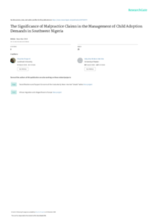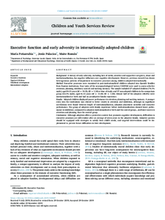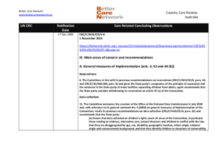Displaying 121 - 130 of 622
This study investigated the exactitude of claims on the existence of corrupt practices and systemic vulnerabilities within the child adoption domains in Nigeria.
The purpose of this study was to seek a more thorough understanding of the education and preparation adoptive parents receive regarding potential child issues in international adoption.
In this study, executive functions were examined in post-institutionalized children adopted into Spanish families from Russian institutions.
This country care review includes the care related Concluding Observations adopted by the Committee on the Rights of Persons with Disabilities and the Committee on the Rights of the Child.
The objective of this study was to evaluate the health status and anthropometrical development of adopted children from Ethiopia living in southern Spain.
This study analyzes the influence of children’s preadoptive history and adoptive parents’ characteristics on the psychosocial adjustment of nationally and internationally adopted children in Germany.
The aim of this article is to review adult adoptees’ demands for post-adoption resources, applicants’ characteristics and resources offered to them.
This article summarises how genetically informed research designs can help disentangle genetic from environmental processes underlying psychopathology outcomes for children, and how this evidence can provide improved insights into the development of more effective preventive intervention targets for adoptive and foster families.
This article presents a case study of a 15-year-old boy whose severe difficulties were understood and formulated in terms of ‘attachment problems’ for many years.
Looked after and adopted children are among the most vulnerable in our society and it is well established that they present with a higher prevalence of mental health problems than children who live with their birth family. This article presents a case study of a 15-year-old boy whose severe difficulties were understood and formulated in terms of ‘attachment problems’ for many years.



